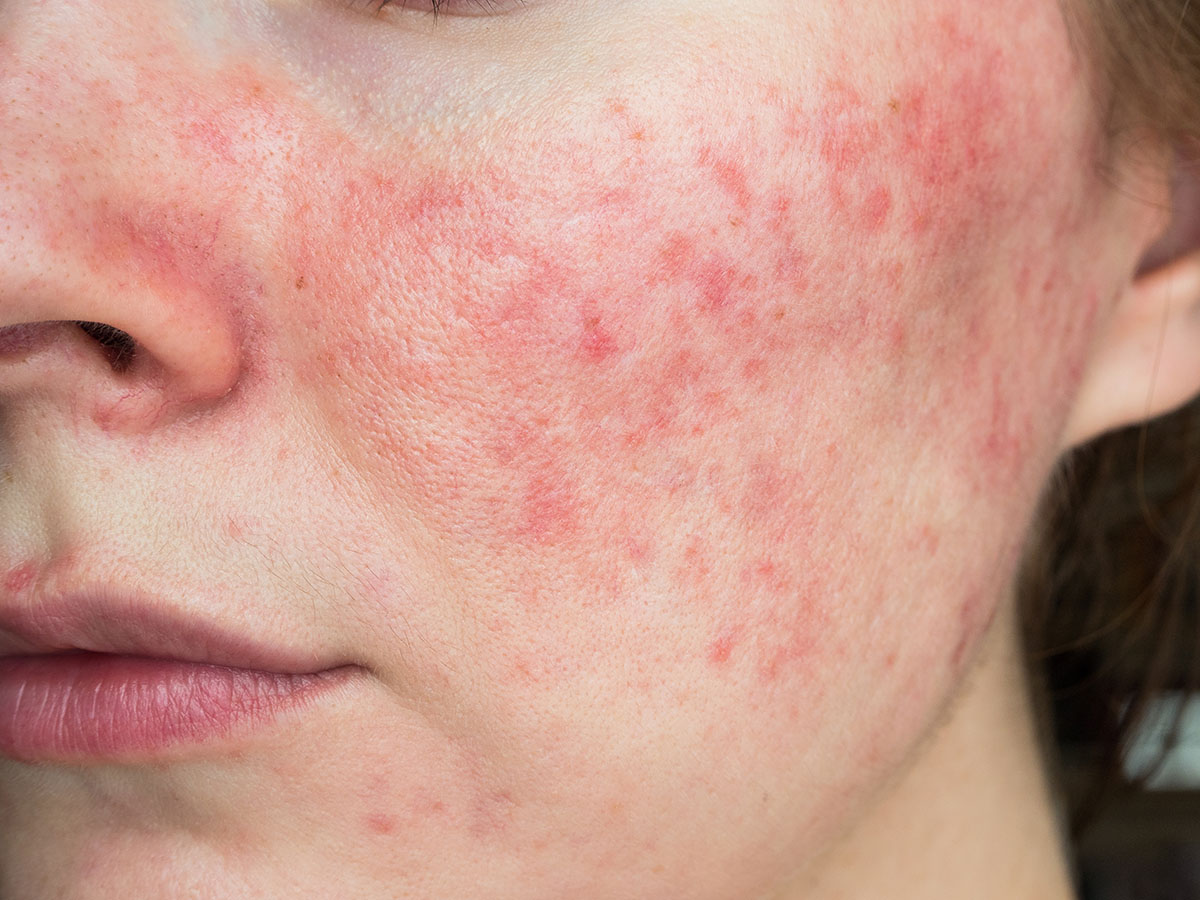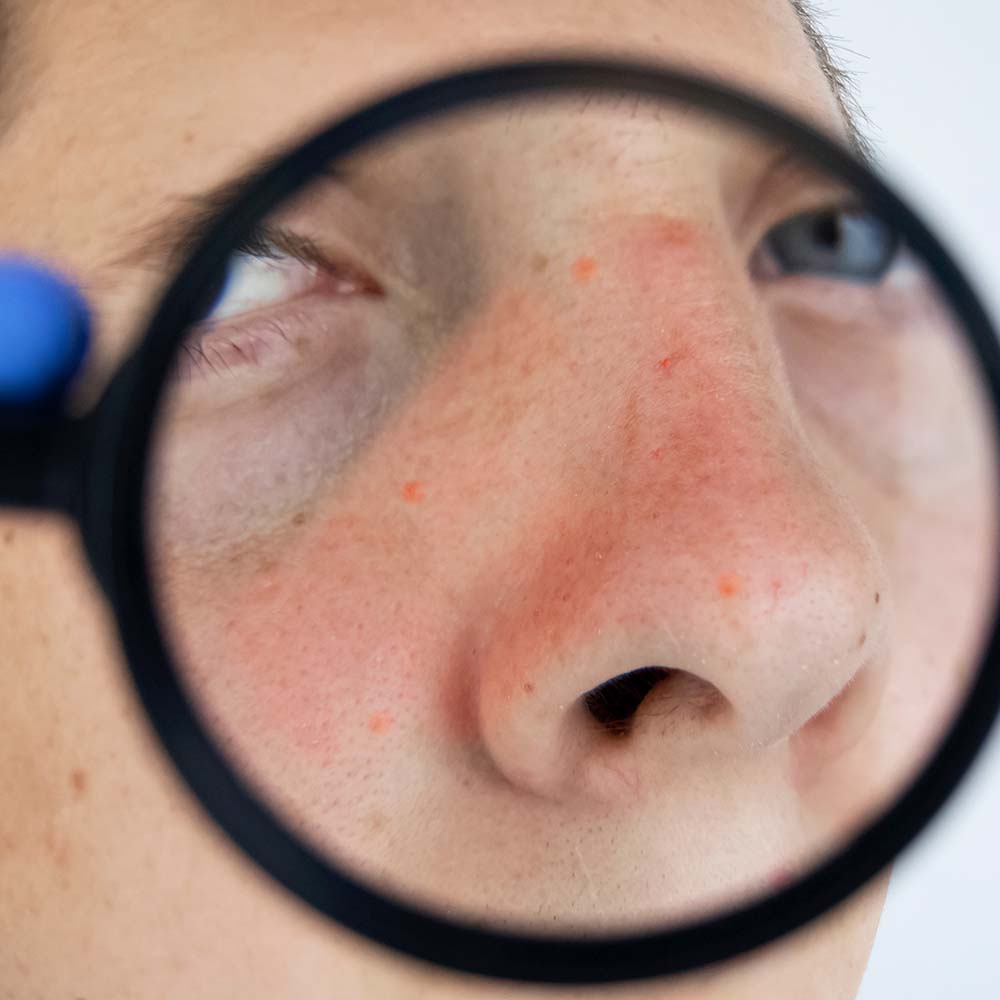Rosacea Skin Condition

Rosacea is a common skin condition that can affect individuals of all demographics.
Rosacea is a chronic inflammatory skin condition that primarily affects the face. It is characterised by redness, pimples, and visible blood vessels, often concentrated in the central area of the face, including the cheeks, nose, chin, and forehead.
Types Of Rosacea
There are four main subtypes of rosacea, each with slightly different presentations.
Erythema-telangiectatic Rosacea
This subtype is characterised by facial flushing, redness, and visible blood vessels.
Papulopustular Rosacea
This type involves redness, bumps, and pimples that resemble acne, but without blackheads.
Rosacea Conglobates
This is a more severe form with large, inflamed bumps and nodules.
Ocular Rosacea
This affects the eyes, causing irritation, dryness, and redness.
Symptoms Of Rosacea
Redness
This is the most common symptom, appearing as flushing or persistent redness, particularly in the central facial area.
Small, Pus-filled Bumps
Bumps and pimples that resemble acne may appear on the reddened areas.
Visible Blood Vessels
Tiny dilated blood vessels may become visible on the surface of the skin.
Eye Irritation
Some people with rosacea experience symptoms like dry, itchy, bloodshot eyes, or a burning sensation.
Swollen, Red Nose (Rhinophyma)
In severe cases, the skin on the nose may thicken and become bulbous.
Although rosacea is not a fatal skin condition, rosacea skin can be a challenge to manage, with redness and blemishes often affecting one’s self-confidence. Rosacea can be a source of significant psychological distress for many individuals.
Rosacea Triggers
Several factors can trigger rosacea flare-ups, including:
Sun Exposure
Skin exposure to ultraviolet rays and sunburn are common triggers.
Hot Environments
Increased temperatures from the environment such as warm weather and humidity can contribute to symptoms. Heat treatments, sauna and steam rooms can worsen redness.
Skin Care Products
Harsh chemicals or irritating ingredients in skincare products can be problematic for rosacea.
Genetics
Rosacea is more common in people with a family history of the condition.
Medications
The use of certain medications may also influence the development and progression of rosacea to include; vasodilators, steroids and some antibiotics may trigger flare-ups.
Psychological Stress
Emotional stress can worsen rosacea symptoms.
Mechanical Trauma
Individuals with a predisposition to rosacea may experience more symptoms with the application of harsh scrubbing on the skin.
Skin Microbiome Imbalance
The use of soaps and detergents can strip and disturb the carefully balanced skin microbiome, thus can contribute to rosacea symptoms.
Diet
Stimulating foods and drinks such as caffeine and spicy foods can dilate blood vessels and aggravate symptoms. Alcohol consumption can cause flushing and worsen rosacea.
Lifestyle
Sleep deprivation, too much alcohol consumption, recreational drugs, smoking, lots of air travel, and a generally poor lifestyle can affect the equilibrium of the body, which can contribute to rosacea symptoms.
Rosacea Treatments
For optimum results rosacea is best treated holistically, that is treating the person as a whole rather than treating the specific condition in isolation.
The management of rosacea, regardless of its severity, should commence with a comprehensive consultation and skin analysis. This appointment should encompass discussions about the nature of the skin conditions, proper skincare practices, an overview of lifestyle and diet, with realistic treatment expectations.
Seek a professional, experienced skin aesthetician to carry out such an assessment. They can provide guidance for the treatment most suited to your skin’s needs.
A proactive approach can lead to fewer symptoms with a calmer and clearer complexion over time.
Long-term maintenance treatment is often necessary because most rosacea treatments are considered suppressive and not curative, particularly if an individual with a predisposition to rosacea.
Responses to a treatment may vary from each individual. Therefore, it may be necessary to make adjustments over time to the treatment regimen, to optimise both the tolerability and efficacy of the treatment.
There are a number of treatments available for rosacea, depending on the severity of the skin condition. The right treatment plan can effectively manage symptoms and prevent flare-ups.
Rosacea is a manageable skin condition. With proper diagnosis, treatment, and lifestyle adjustments, you can effectively control symptoms and improve your quality of life.
The primary treatment for mild rosacea could be over-the-counter topical creams and gels containing antibiotics, metronidazole, or azelaic acid which can reduce inflammation and redness.
The treatment approach for more severe rosacea could involve over-the-counter topical treatments and in addition prescribed oral medications such as antibiotics.
The in-clinic treatment of rosacea, regardless of its severity, would benefit from Laser therapy such as the Nlite Laser Treatment and Vasculase Vein Removal, which target visible blood vessels and improve the appearance of the skin. LED Light Therapy may be helpful for some people. Oxygen Therapy can provide a cooling, healing affect on the skin. Specific Chemical Skin Peels can support the rosacea treatment plan.
Individuals who have experienced inflammatory responses on the skin as a result of rosacea, would also benefit from products that contain ingredients such as azelaic acid, vitamin C, hyaluronic acid and chamomile.
With over 35+ years, The Emporium Treatment Clinic senior aesthetician, Angela is able to help you to take the appropriate measures. So why not pop in and visit us in Marylebone, London, if you feel you need a consultation.
12 tips from Angela on the topic to minimise Rosacea:
1. Avoid harsh skin care products.
2. Seek a cleanser with a similar PH to the skin (4.5-5.5).
3. Wash your face twice a day with a gentle cleanser.
4. Use oil-free products such as gels and fluids.
5. Select non-comedogenic skin products to avoid blocking the pores.
6. Apply products that contain azelaic Acid, vitamin C, hyaluronic acid and chamomile to calm the skin.
7. Limit your intake of stimulating foods and drinks such as caffeine, spicy foods and alcohol.
8. Limit your intake of processed foods, sugary foods and drinks that contribute to inflammation in the body and skin.
9. Eat a nutritious, varied and balanced diet to support overall health and the immune system.
10. Manage stress to regulate the hormones and support the immune system.
11. Seek a healthy lifestyle. Avoid recreational drugs and smoking.
12. Avoid intense heat.
Consider Supplements
Supplement your health and skin with Antioxidants, Vitamin E, Zinc, and Vitamin D, Super Greens, Milk Thistle, Turmeric to name but a few. Emporium Treatment Clinic experts highly recommend the ‘Viridian’ brand for quality and purity.

Expert Advisors
Here at Emporium Treatment Clinic in Marylebone, we provide expert advice in skincare for home use or professional in-clinic treatments.
In addition to the Emporium Treatment Clinic core practice, selected elite independent practitioners provide an array of health, nutrition & wellness services and treatments.
Our team of experts combine a wealth of knowledge, and have collaborated to provide the ultimate synergy of diverse strategies to provide you not only with a clearer, glowing complexion but, most importantly, to nurture health and well-being from within.
SHOP FOR VIRIDIAN HEALTH SUPPLEMENTS HERE
Need help to decide which supplements are best for you?
Contact Angela For A Free Chat
07930 661971
Why not look at our latest treatment offers here!
Author: Angela Taffinder the founder of Emporium Treatment Clinic. A practising Aesthetician for 35+ years, holistic and wellbeing advocate and yoga instructor. The creator of Yoga & Vitality.
Skin Care & Body Analysis & Consultation
Available at Emporium Treatment Clinic provided by Angela Taffinder the founder of Emporium Treatment Clinic and practising Aesthetician for 35+ years
Contact Us here
Health & Wellness Analysis & Consultation
Available at Emporium Treatment Clinic provided by highly qualified, experienced Doctors, Nutritionist, Holistic Medicine practitioners and Wellness experts.
Contact Us here
